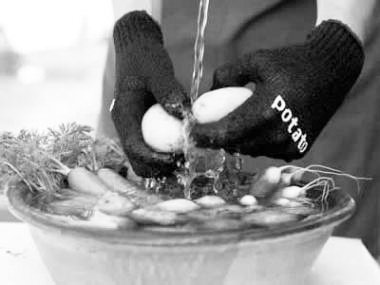Do you know where your veggies have been?
 CREDIT: STOCK PHOTO
CREDIT: STOCK PHOTOCleaning your fruits and vegetables before eating them is good practice.
Whether or not washing your vegetables and fruits before consuming them has been a common household practice, there are very real reasons why you should be cleaning your vegetables and fruits before serving and eating them, including the skins and peels you do not eat. There are harmful pesticides, chemicals and residues that can be left on your vegetables and fruits when they are grown and harvested.
According to Rachel Nall's article, "Why Is it Important to Wash Vegetables Before Eating Them?" from LiveStrong.com, vegetables that are grown in the ground (potatoes, carrots, etc.) have an increased risk for coming into contact with other contaminants in the soil. Secondly, the vegetables and fruits are then shipped to a warehouse, where they are handled by more hands, dirty equipment and containers for transfer.
Lastly, produce is then shipped in containers to your local grocery store, where they are then handled for a final time. Although the fruits and vegetables may look like they are clean, with no visible dirt or residue, the more harmful the contaminant, the harder it is to see. For example, you cannot see the chemicals, pesticides, residues and bacteria sitting on the surface of each and every fruit or vegetable, according to Shereen Jegtvig, author of "Meal Planning and Cooking: Wash Your Fruits and Vegetables" (to read the full article, check out tinyurl.com/mealplanning2013).
When these pesticides, chemicals and bacteria are left on your produce items, they have the opportunity to infect the human body with foodborne illnesses such as salmonella, Listeria and E. coli. According to Nall's article, washing your veggies and fruits is just an extra precautionary measure that prevents the spread of foodborne illnesses. (For more details, visit tinyurl.com/washingvegetables)
Although the risk of getting foodborne illnesses from pesticides on fruit and vegetables is low, due to the strictly monitored pesticides on fruits and vegetables, there is still a chance. But by washing produce before consuming it, you can eliminate the possibilities further.
Kathleen Zelman's article "Lettuce Learn to Wash Produce Properly," from MedicineNet.com, highlights the proper ways to wash fruits and vegetables:
1. Wash the produce under a stream of cool water or using the spray nozzle of your faucet.
2. Rub the produce with your hands or use a vegetable brush to remove all potential bacteria from the crevices on the fruit or vegetable.
3. The best thing to use when cleaning vegetables is just plain running water from the tap. Special detergents have been designed and are deemed safe to use on vegetables and fruits, but have not shown any more benefit than just using running water.
4. After you are sure the produce is washed properly, cut out any of the bad spots on the fruit or vegetable.
5. Always wash your hands after you are done washing the produce.
Remember that it's important to wash your food, even if you eat only organic fruits and vegetables. Bacteria and harmful contaminants (especially from soil) can still make their way onto produce through the air, the soil or the journey it takes to get to your grocery store.
As David Grotto, registered dietitian and spokesman for the American Dietetic Association said in Zelmans' article, "(The) fear of contamination should not keep you from enjoying the many nutritional benefits of produce. Just make sure you follow safe food-handling procedures in your kitchen, and you can continue to enjoy all the vitamins, minerals, fibre and disease-protecting health benefits of all produce, including lettuces and greens." (Read more at tinyurl.com/learntowashveggies)
Lauren Brull is a Fitness and Health Promotion student at Fanshawe College.
Editorial opinions or comments expressed in this online edition of Interrobang newspaper reflect the views of the writer and are not those of the Interrobang or the Fanshawe Student Union. The Interrobang is published weekly by the Fanshawe Student Union at 1001 Fanshawe College Blvd., P.O. Box 7005, London, Ontario, N5Y 5R6 and distributed through the Fanshawe College community. Letters to the editor are welcome. All letters are subject to editing and should be emailed. All letters must be accompanied by contact information. Letters can also be submitted online by clicking here.













